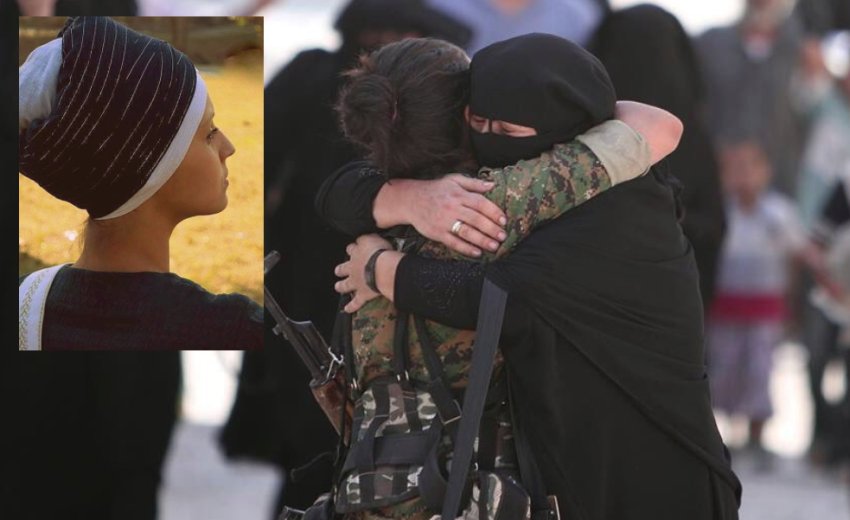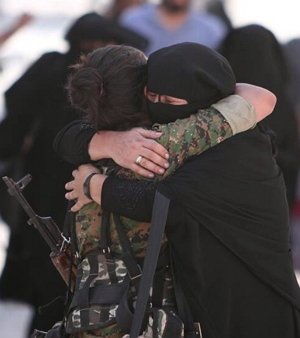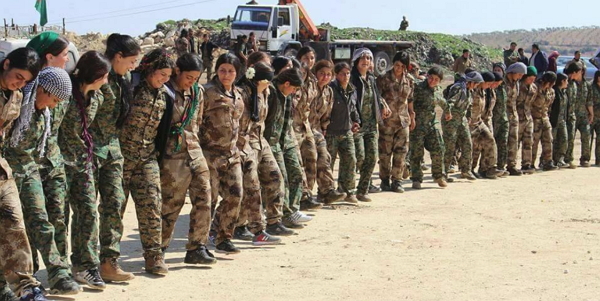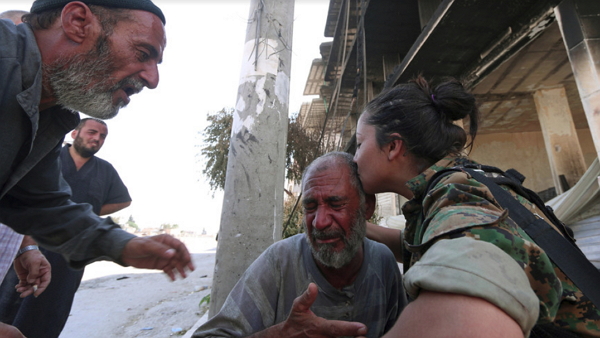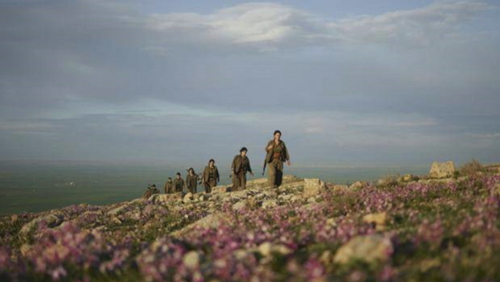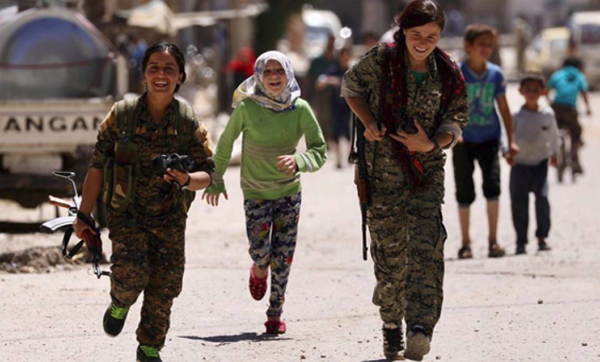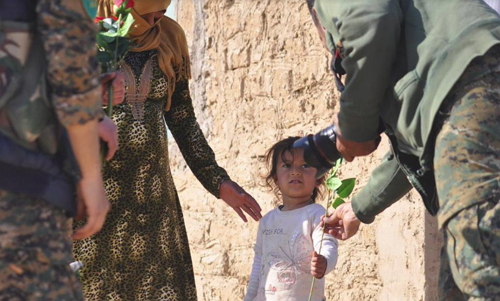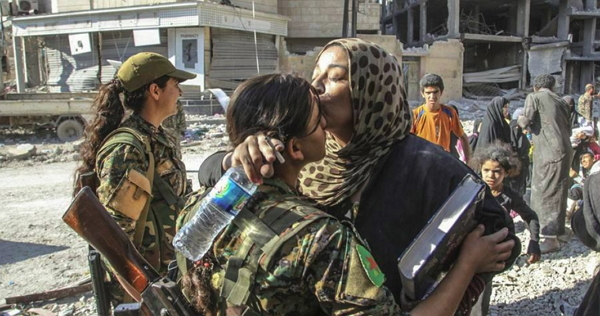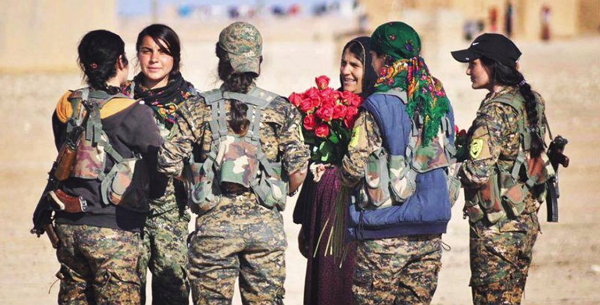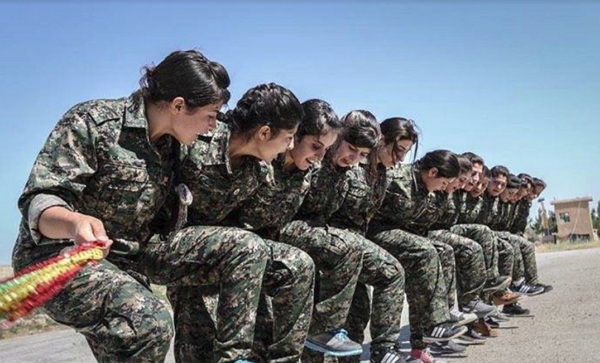Editors Note: The following is an expose on the virtues and struggle of the Kurdish people. It is passionately written by a Brazilian Sikh convert. Here is a brief message from the author:
"I write this email to to make an important request, to open your eyes to the Kurdish people. The revolution that this people, especially women have been doing in the Middle East, reminds me a lot of our Sikh legacy... I ask from the bottom of my heart prayers, attention and support for this people who have been planting the seed of a new and beautiful future for the world."
The history of the Kurdish people can be traced to over six thousand years in a territory that is considered the cradle of civilization, a region that nowadays locates Turkey, Syria, Iraq and Iran. This region was subject to many empires, such as the Assyrian, Babylonian, Persian, Abbasid, Turk-Seljuk, and more recently, the Ottoman Empire. The ottomans were always conquerors, like most empires, however they denied the people subject to them the right to exist according to their own ethnic identity, as they did with the Kurds, that even though they were excluded from social and economic relations they always had a strong sense of identity and independency, denying the yoke of many empires' tyranny.
Because they came from a region marked by conflict, characterized by a chaotic socio-political history since World War One, the Kurdish people are currently the biggest stateless nation of the world. However, even facing such a dire situation, they are unfazed.
The Kurds knew how to extract from their experiences significant lessons to face the attacks they receive throughout their history. In current times, they experienced new forms of conflict. The Syrian civil war, that began in january 2011, and the attacks of the so called Islamic State of Iraq and Syria (ISIS or Daesh), after 2014, intended to subject the peoples to the yoke of dogmatic interpretations of Islam and to a radical and exclusivist puritanical and distorted interpretation of that canon. They threatened the diverse ethnicities of the region, including the Kurds.
Facing extreme violence and repression, the Kurds continue the struggle for liberation while at the same time seeking to build a new societal model which they name Democratic Confederalism. And it is amidst diverse attacks and under ruins, that the Kurds are building this new socio-political system that has as its pillar a true popular democracy, equal in ratios, feminist, inclusive and ecological, in which decisions are made by councils and community assembles and by the population that lives in the cities, provinces and villages, respecting the gender and ethnicity ratio.
Women have had a crucial role in these transformations. They have taken leadership positions in every societal sphere and have established equal representativity in the governmenance structures through a 50% quota and co-presidencies. The women's liberation movement also relies on autonomous defense units, academies and economic cooperatives.
The women's autonomous self defense units YPJ (Yekineyen Parastina Jinê) are an army of women that act in the borders, cities and villages with the intent to protect women and the local populace, acting together with the male army, YPG (Yekineyen Parastina Gel). YPJ and YPG guide themselves by ethical values from a Kurdish society that has been developing a judicial system that seeks peace and consensus and that has been replacing the concept of punitive justice by the concept of restorative justice. To exemplify, when the Kurds are taken prisoners by the islamist fundamentalists, they are generally beheaded alive. By contrast, when the Kurdish enemies are captured by the Kurdish protection units, they are merely arrested. The Kurds loathe any type of violent practice against prisoners, prisoners that when receive classes of moral and ethical principles, pluralism, religious tolerance and feminism, as it can be seen in a report of an episode of restorative justice that has occurred in Kurdish territory:
In 2012 five members of the Al-Nusra fundamentalist group were released and returned to the ranks of their former group, but there they captured fifty of their former comrades to take them to Syrian Kurdistan so that they also could be taught.
The classes on ethical principles are made by academies that are educational institutions directed by women. The academies promote women's self organization in communication, arts, culture, literature, economy and politics, stimulating critical thinking, self criticism and the development of democratic content from a woman's standpoint and through study groups, courses and other activities. These spaces have had as a result significant changes in the mental structures of men and in consequence of the whole society.
The economic cooperatives seek the fair redistribution of the economic resources, the social benefits and not wealth accumulation and excess production, also valuing an ecological production that respects the environment, monitoring and limiting some types of industrial activity for an example. Also concerned with the soil of territories devastated by bombings, the Ecological Committee of the Cizire Canton, north of Syria, created the "Make Rojava Green Again" project, that consists in replanting the areas devastated by war.
This is one of many examples of what is being built by the kurdish people amidst the chaos of war. The existence of a society that has been creating a new socio-political model, that seeks for coexistence values and opens doors to ethnicities originating of all cardinal points, respecting identities, placing all individuals in equal positions, including women, is what many call to live an utopia and has battled the pillars of maintenance of inequalities, domination and oppressions utilized before by empires and currently by nation-states and other political actors that incite wars according to their political interests, playing with the lives of different ethnicities, generating conflicts and genocide.
"However, the Kurds exist" (Ocalan, Abdullah), and they have understood throughout their experiences the clear traps of the bloody power and territorial disputes between ethnicities, often times orchestrated by the ones above. The kurds and other ethnicities claim other values and types of power, as it can be seen in an excerpt of a social contract:
Kobane, Cizire, a confederation of Kurds, Arabs, Assyrians, Chaldees, Arameans, Turkmen, Armenians and Chechnyans, out of free will, solemnly declare and establish this letter that was written in accordance with the principles of Democratic Autonomy. Seeking liberty, justice, equality, dignity and environmental sustainability, that the letter proclaims a new social contract, based on the peaceful and mutual coexistence, in the comprehension between all components of society. The rights of the people and self determination are protected [...] building a society free of authoritarianism, militarism, centralism and of the intervention of religious authorities in public affairs.
For these reasons, the Kurdish people have not received proper support and attention from the international community, being ignored and too commonly overlooked amidst confusing and superficial news about the rumorous civil war in Syria, or misinterpreted, when they are not called terrorists or separatists.
Turkey, the region where most of the Kurdish population is located, is one of the states that oppose this societal model, prohibiting even the usage of the kurdish language, denying through this and other resources the acknowledgement of the ethnic, political and territorial Kurdish identity.
By the end of January in 2018, the Turkish president Recep Tayyip Erdogan began a campaign in Turkish media that threatened to attack Afrin, of Kurdish majority, in northern Syria, in case the Kurdish protection forces didn't withdraw, under the pretext of a so-called Turkish border security. Afrin, as well as the Kurdish self defense forces, never threatened Turkey, on the contrary, they have struggled for years against the barbarism of ISIS, with the goal of not only liberating the Kurdish people in north Syria, but also of protecting humanity from the terror of the so called Islamic State. The Kurdish self defense forces, YPJ and YPG, based in military principles only for self defense, have never attacked and have no expansionist pretentions, and this battle, as the Kurds say, "is not for the territory, but for time".
The Turkish attacks with bombings and offensives against villages filled with innocent civilians have generated hundreds of casualties. Militias supported by the Turkish government have killed, maimed and showed corpses of a Kurdish combatant with the goal of spreading terror between women. All of this demonstrates the cruel pretensions of the Turkish government, overall about the societal advances carried out by the Kurdish women.
In February 8 of this year, the Turkish air force bombarded the ruins of the Ishtar temple, in Ain Dara, where there were vestiges of a matrilineal culture (signs of steps and a winged lion that demonstrated the presence of the goddess in the temple), demonstrating disrespect by the history of the people that have lived and live in that religion and hostility for any vestige of women's force and sovereignty, be that the one demonstrated by women in current days or by the women of the people that have lived in the region in the past.
Even facing so much spilled blood and over the continuous threat of death, the kurdish people and their brave warriors with their guns and flowery scarves tied to their heads carry on on the "battle for time", because they understand that even though they may lose some battles, they have produced a strong legacy in the bosom of their society. The Kurd men and women have responded to Turkish state terrorism and ISIS not only in the battlefronts, but also, occupying streets with crowds inside and outside the Turkish territory. The Kurdish people, overall the women, have sought for recognition and international support. They need their voices to echo throughout the world.
We, that seek justice, peace and equality amongst all beings have to listen to them, support them and protect them, not only over them being humans, but because they are a people with the right to exist wholly in their own culture, history and identity. The dashing courage of the Kurdish people has brought light to the middle east and inspired the west to reevalue ready-made formulas and impositions of old policies that reinforce hierarchies, inequality and oppression that subjugate other people.
Link to videos with a few images of the kurdish people:
Video I: https://www.youtube.com/watch?v=CECtQirn9Qw
Video II: https://www.youtube.com/watch?v=184TeEkbxi4
